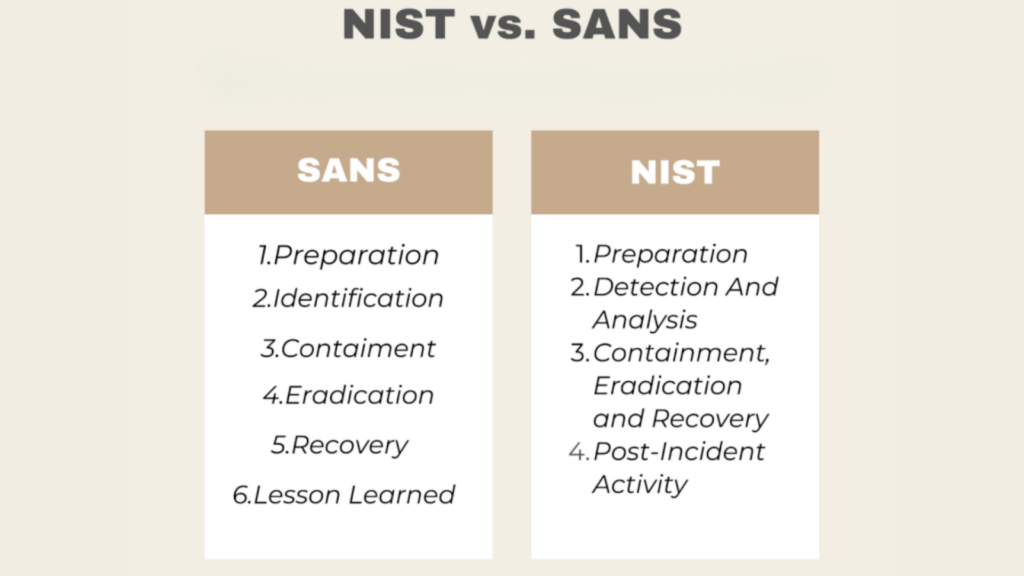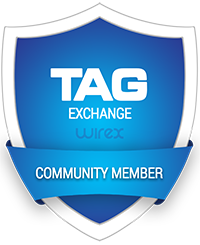SANS, or the SANS Institute, is a leading organization in the field of cybersecurity training. Founded in 1989 by Stephen Northcutt, SANS has grown to become arguably one of the most respected and sought-after sources of information security training and certification. In this article, we’ll explore the essential roles of two leading organizations, SANS and NIST, in shaping cybersecurity best practices and equipping individuals with crucial skills. We’ll take a closer look at SANS, a preeminent institution for cybersecurity training, and its extensive array of courses and certifications.
We’ll highlight how SANS helps individuals stay ahead of the rapidly evolving cyber threat landscape. Furthermore, we’ll clarify the differences between SANS and NIST, empowering you to choose the right path for your cybersecurity learning journey. Finally, we’ll introduce you to the cutting-edge cybersecurity solutions offered
by WireX. So, buckle up for an enlightening journey into the ever-changing world of cybersecurity.
Why wait until your digital assets are at risk? Empower your organization with state-of-the-art cybersecurity solutions today. Join the ranks of vigilant businesses who trust WireX to safeguard their digital frontiers. Visit WireX now and learn how you can fortify your cyber defenses. Your journey to robust security starts here – with WireX.
What Is SANS?
SANS (SysAdmin, Audit, Network, and Security) is a pioneering and globally recognized organization in the realm of cybersecurity education. Established in 1989 by Stephen Northcutt and Alan Paller, SANS has evolved from its initial focus on technical conferences and presentations to become an industry leader, offering comprehensive training and certification programs for IT professionals, including security analysts, system administrators, and network engineers.1
History And Evolution Of SANS Training Courses
SANS (SysAdmin, Audit, Network, Security), founded in 1989, stands as a global leader in cybersecurity training and certification. Initially a training hub for system administrators, it swiftly broadened its horizons to cover audit, network, and security topics, enabling organizations and individuals to safeguard their networks and data against ever-evolving cyber threats.
Now, SANS provides over 60 specialized courses, from beginner to advanced levels, focusing on the latest industry trends and threats. These courses, available in both traditional classroom settings and through flexible online and virtual platforms, equip individuals and organizations with robust cybersecurity defenses and keep them up-to-date on the shifting cyber threat landscape.
Goals And Objectives Of SANS
SANS (SysAdmin, Audit, Network, Security) is an internationally recognized leader in cybersecurity training and certification. With over 60 specialized courses and certifications, SANS is dedicated to equipping individuals and organizations with the skills and knowledge necessary to protect their networks and data from cyber threats.
Cybersecurity
Cybersecurity is the art and science of safeguarding digital landscapes – networks, systems, and programs – from cyber attacks. These attacks, typically designed to infiltrate and manipulate sensitive information, extort funds, or disrupt regular business operations, underscore the need for comprehensive cyber defense strategies.
Professionals in the field employ an array of measures, such as firewalls, encryption, user authentication, and vigilant monitoring to fortify network and data security. Beyond implementing these tools, they also construct robust policies and procedures to secure all user activities.
Furthermore, they carry out meticulous risk assessments to pinpoint potential vulnerabilities, thereby devising strategies to diminish the likelihood of a successful cyber onslaught. Hence, cybersecurity isn’t merely about prevention but also involves adept threat detection and swift response.
Compliance
Compliance forms a crucial cornerstone of cybersecurity, and SANS is at the forefront of offering training and certifications that equip organizations to fulfill these mandates. The comprehensive SANS curriculum provides in-depth knowledge of compliance regulations and industry best practices, enabling organizations to spot and rectify potential risks and vulnerabilities.
These courses and certifications not only help organizations stay compliant with relevant laws and regulations but also keep them abreast of the latest security trends. Moreover, SANS offers valuable guidance and resources to aid organizations in the creation and upkeep of effective compliance policies and procedures.
Professional Certifications
Professional Certifications provide an unbiased affirmation of a professional’s expertise in cybersecurity. These certifications span a wide array of topics, including but not limited to penetration testing, incident response, digital forensics, and secure coding.
SANS certifications uphold the gold standard of professional excellence. They are meticulously crafted based on current industry standards and best practices and are regularly refreshed to align with the rapidly evolving cybersecurity panorama. Thus, holding a SANS certification signifies an individual’s cutting-edge knowledge and skills in their respective cybersecurity domain.
Risk Management
Risk Management encapsulates the process of identifying, analyzing, and mitigating potential risks associated with an organization’s information systems. SANS offers an array of training courses and certifications tailored to instill effective risk management practices.
These courses cover a broad spectrum of risk-related topics, from risk assessment and analysis to communication. They delve into the nuances of threat identification, impact understanding, and development of risk mitigation strategies. Additionally, they extend into areas like data security, asset management, and incident response, equipping organizations with a comprehensive understanding and practical tools for efficient risk management.
SANS Training Programs And Certifications
SANS Training Programs and Certifications offer a holistic approach to cybersecurity, catering to a full spectrum of topics and disciplines. Designed to fortify the skills and knowledge of individuals and organizations, these programs ensure robust protection for networks and digital assets.
The SANS curriculum encompasses network security, security policies, risk management, compliance, and professional certifications. These courses aim to foster a robust cybersecurity foundation, empowering individuals and organizations with the necessary tools to fend off cyber threats.
SANS provides certifications for all skill levels, from entry-level ones like the Global Information Assurance Certification (GIAC) to advanced ones such as the GIAC Security Expert (GSE). These certifications validate an individual’s or an organization’s commitment and proficiency in cybersecurity.
In addition to courses and certifications, SANS also offers a wealth of resources such as blogs, webinars, podcasts, and the SANS Security Awareness Program to keep individuals and organizations current on cybersecurity developments.
Ready to take your cybersecurity game to the next level? It’s time to act! Harness the power of the latest technology and threat intelligence to safeguard your organization. Get in touch with the experts at WireX today and embark on your journey to robust cybersecurity. Don’t wait for a threat to emerge – be proactive, and secure your future with WireX.
The Role Of SANS In Cybersecurity
SANS, the world’s leading provider of cybersecurity training, certifications, and research, plays an integral role in safeguarding organizations and individuals from cyber threats. Here are roles of SANS in cybersecurity:
Provide Training And Certification
SANS offers all-encompassing training and certification programs across various cybersecurity domains. Crafted to arm individuals and organizations with the essential skills and knowledge to shield their networks and data against cyber threats, these programs delve into areas like network security, risk management, compliance, and professional certifications.
Guided by SANS-certified, seasoned instructors, the courses are accessible in both online and in-person formats, providing the flexibility for learners to progress at their comfort. The prestigious certifications from SANS, highly coveted in the cybersecurity industry, can pave the way for exciting career opportunities.
Develop Industry Standards
SANS is instrumental in shaping industry standards in cybersecurity. By offering an array of training and certification programs, SANS equips organizations with an understanding of the latest security threats and effective defense strategies for their networks. It also imparts guidance on best practices for establishing cybersecurity policies and procedures.
In collaboration with industry experts and organizations, SANS develops widely accepted standards that enforce appropriate security protocols and ensure industry compliance. These standards aid organizations in maintaining secure, technologically current networks.
Provide Threat Intelligence
SANS offers cutting-edge threat intelligence services to help organizations and individuals navigate the dynamic cyber threat landscape. Threat intelligence involves collecting, analyzing, and interpreting data related to online threats and cyber adversaries. This vital information helps pinpoint potential threats and vulnerabilities, enabling organizations to mitigate risks proactively.
SANS’s threat intelligence services encompass real-time monitoring of suspicious actors and networks, malware analysis, and threat actor profiling. Furthermore, SANS provides a host of training programs designed to hone the skills needed to identify and counter cyber threats.
SANS Vs. NIST: Understanding The Differences
SANS and NIST are premier organizations in cybersecurity, albeit with distinct focuses.
SANS is a global frontrunner in cybersecurity training and certification, offering specialized courses to enable individuals and organizations to stay abreast of the rapidly changing cyber threat landscape. It also contributes to developing industry standards and furnishing threat intelligence.
On the other hand, NIST, a U.S. government agency, establishes standards for information systems and network security that are widely adopted by organizations and governments globally. Its cybersecurity standards span areas like network security and security policies.2
While SANS primarily offers training and certification, NIST’s focus lies in setting security standards. Therefore, SANS helps entities stay updated on cyber threats and fortify their networks, whereas NIST provides standards and guidelines to aid organizations in creating secure networks and systems.

Cybersecurity Standards
Cybersecurity standards are a set of best practices and guidelines designed to protect organizations from cyber threats and vulnerabilities. Cybersecurity standards provide organizations with a framework for developing, implementing, and managing their cybersecurity programs. They are also used to assess the security of an organization’s systems and networks.3
Network Security
Network security is the practice of protecting a computer network and its associated hardware, software, and data from unauthorized access and malicious attacks. It involves the implementation of policies and procedures, such as firewalls, encryption, and authentication, as well as the use of tools and technologies to monitor and detect suspicious activity. Network security is essential for organizations of all sizes, as it helps to protect sensitive information, maintain system availability, and ensure compliance with applicable laws and regulations.
Security Policies
Security policies are the cornerstone of any effective cybersecurity strategy. They provide guidance on how to protect organizational assets and information from unauthorized access, malicious attacks, and other cyber threats. Security policies are typically created and maintained by the IT department, but may include input from other departments, such as Human Resources and Legal.
Security policies should be tailored to an organization’s individual needs, but should generally address the following topics:
• Access control: Establishing who has access to what resources and information, and how to manage and monitor access.
• Data security: Defining how data should be stored and handled, including encryption, authentication, and backup.
• Network security: Establishing parameters for network architecture, such as firewalls, VPNs, and other security measures.
• Endpoint security: Establishing standards for devices, such as laptops and smartphones, that access the network.
• Incident response: Establishing how the organization will respond to and manage security incidents.
• Employee security: Establishing guidelines for employee behavior related to security, such as password policies and acceptable use of devices and networks.
Final Thoughts
As a premier cybersecurity training institution, SANS offers a comprehensive suite of courses and certifications. These resources help individuals amplify their cybersecurity prowess and remain vigilant against the dynamic cyber threat environment.
SANS is an excellent choice for those aiming to fortify their cybersecurity knowledge and stay abreast of the newest threats. By comparing and contrasting SANS and NIST, you can make an informed decision about the organization that most aligns with your cybersecurity learning objectives.
Harness the power of SANS to stay ahead of the curve and secure your digital landscape against emerging threats. If you’re ready to elevate your cybersecurity strategy, consider leveraging WireX’s advanced solutions. Schedule a demo with WireX today and witness the future of cybersecurity.
Sources:
- SANS – Sysadmin, Audit, Network and Security Organization – 307 Words | Essay Example. (n.d.). Free Essays. Retrieved May 15, 2023, from https://ivypanda.com/essays/sans-sysadmin-audit-network-and-security-organization/
- What is NIST (National Institute of Standards and Technology)? – Definition from WhatIs.com. (n.d.). SearchSoftwareQuality. https://www.techtarget.com/searchsoftwarequality/definition/NIST
- Shea, S. (2021, August). What is Cybersecurity? Everything You Need to Know. SearchSecurity. https://www.techtarget.com/searchsecurity/definition/cybersecurity
FAQs
What Types of Courses Does SANS Offer?
SANS offers a wide range of specialized courses, certifications, and programs designed to help professionals stay ahead of the constantly evolving cyber threat landscape. Choose from over 60 courses and certifications, including security essentials, security operations, incident response, digital forensics, cloud security, and insider threat. Each course is designed to help professionals build their knowledge and skills in the key areas of cybersecurity.
How Can I Access SANS Training Courses?
SANS provides a variety of ways to access their training courses. You can attend in-person classes, watch live-streamed classes, or take self-paced courses online. You also have the option of attending a virtual event or participating in a private training event.
How Do I Know Which SANS Course to Take?
SANS offers a variety of courses for different skill levels and areas of expertise. To help you decide which course is best for you, SANS offers a “Course Finder” tool on their website. This tool allows you to search for courses based on your skill level, area of interest, and location.
Can I Take SANS Courses Online?
Yes, SANS offers a variety of self-paced online courses. These courses are designed to provide the same level of instruction and content as their in-person classes, but with the added convenience of learning from anywhere.
What Is the Difference Between NIST Policy and Standard?
The National Institute of Standards and Technology (NIST) is a non-regulatory agency of the US Department of Commerce. NIST publishes standards and guidelines related to cybersecurity, including the NIST Cybersecurity Framework. The NIST Cybersecurity Framework provides a set of best practices and guidelines for organizations to use to protect their systems and data. NIST policy, on the other hand, is an official statement issued by the NIST that outlines the agency’s position on a particular issue.







